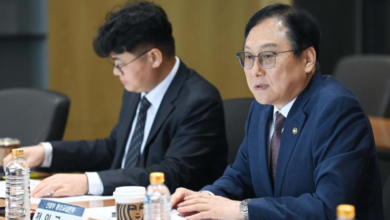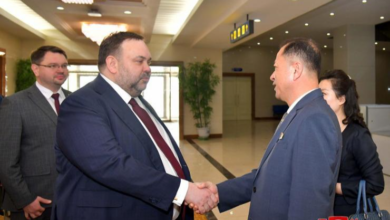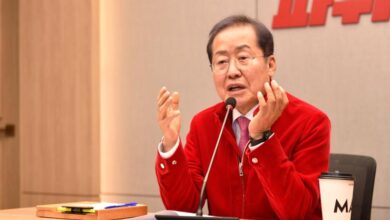https://www.koreatimes.co.kr/www/nation/2024/03/113_371361.html

Rep. Lee Jae-myung, leader of the main opposition Democratic Party of the Korea (DPK), left, and Han Dong-hoon, interim leader of the ruling People Power Party (PPP), during a ceremony marking the 105th anniversary of the March 1 Independence Movement at the Memorial Hall of Yu Gwan-sun in Seoul, March 1. Yonhap
Rival parties have clashed over the idea of revoking the voting rights of foreign residents, a move pursued by the conservative ruling People Power Party (PPP) specifically targeting Chinese nationals.
Rep. Hong Ihk-pyo, floor leader of the main opposition Democratic Party of Korea (DPK), criticized PPP interim leader Han Dong-hoon for associating foreign policy concerns with the upcoming general elections, expressly, the idea of rescinding the voting rights of Chinese nationals with permanent residency here.
“Provoking anti-China sentiment and fostering hatred toward foreign nationals is highly inappropriate for a leader who should have a future-oriented vision,” he said during a radio interview, Monday.
“Han twisted the facts by suggesting that foreign residents could influence the outcome of the upcoming parliamentary elections through their votes,” Hong said, clarifying that foreign residents only have voting rights in local elections, not in elections to choose the president or National Assembly members.
Under the Public Official Election Act, foreign nationals who have resided in Korea for three or more years after obtaining permanent residency are given the right to vote in local mayoral and gubernatorial elections.
Hong remained cautious about displaying his party’s official position on the matter, saying, “Our party is willing to engage in debates after the issue reaches sufficient social consensus based on mutual respect.”
Hong was referring to the PPP leader’s remarks made the previous day when he pledged to revise the Public Official Election Act to strip foreign nationals with permanent residency visas of their voting rights based on the principle of reciprocity. Han said that this move targets Chinese nationals, who account for 80 percent of some 126,000 eligible foreign voters here.
“Korean nationals living in foreign countries do not have their voting rights guaranteed, yet we grant voting rights to foreigners in our country. There is no logical basis or benefit herein. We will rectify this unfairness,” Han said during a party meeting, Sunday.
He also claimed that his party’s efforts to expand the current anti-spy law, another move targeting China, is being hindered due to opposition by the DPK.
The current law defines espionage as “activities aiming to benefit an enemy,” and singles out North Korea as the sole enemy state. Consequently, it does not categorize similar acts benefiting other countries as espionage.
“There is a critical flaw in that espionage charges only target hostile countries, making it impossible to punish those who leak information to foreign countries, such as China. The DPK strongly opposes the proposed amendment to this law,” Han said.
The PPP leader’s outspoken remarks on China were part of denouncing DPK leader Rep. Lee Jae-myung’s pro-Chinese remarks.
During a speech criticizing the Yoon Suk Yeol administration’s foreign policy, Friday, Lee stated, “Just say ‘Xiexie’ (Thank you in Chinese) to China and ‘Xiexie’ to Taiwan too. There is no need to intervene in the Taiwan Strait issue and antagonize China.”
Political observers said that Han’s brazen remarks toward China are part of a broader election strategy to frame the opposition party as submissive to China.
“The liberal bloc has been depicting the PPP as a pro-Japanese party in their election campaigns. The PPP sees the DPK’s perceived subservience toward China and pro-North Korean attitude as a strategic opportunity for a counter-offensive,” said political commentator Rhee Jong-hoon.
Read the full article here








